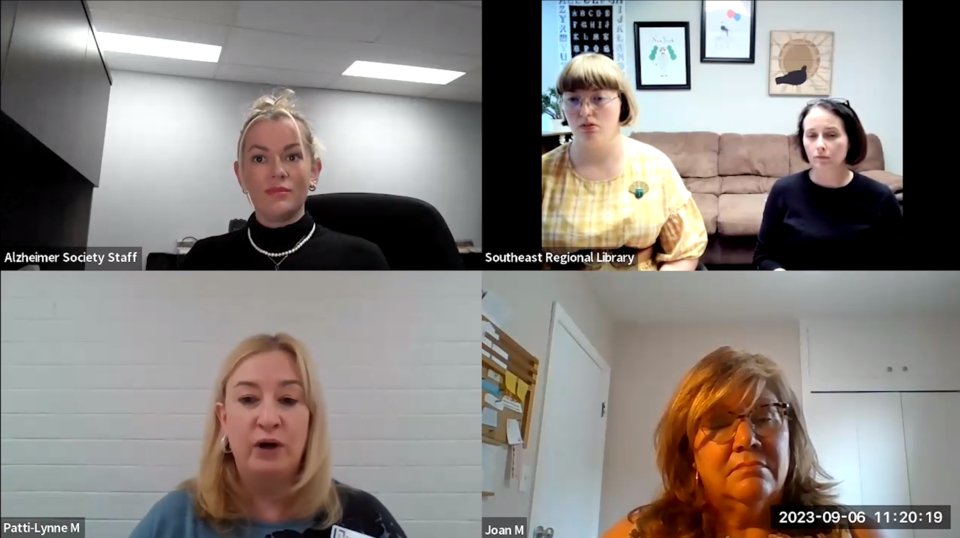The Alzheimer Society of Saskatchewan welcomed a panel of librarians from across the province on Sept. 6 for a Community Conversation on creating libraries and communities that are friendly and accessible to people living with dementia.
The panel was conducted over Zoom and hosted by Erica Zarazun, public awareness co-ordinator for the Alzheimer Society. Her guests were Patti-Lynne McLeod from the Regina Public Library (RPL), Joan Michael from Saltcoats Public Library, and Morgan Kelly and Meagan Dillen from the Southeast Regional Library Headquarters.
"We hope today to share information with everyone watching this presentation about the different services and programs that libraries offer, and remind you that the library is available for everyone," Zarazun said as she introduced the presenters. In a follow-up email, Zarazun noted that, "As you may be aware, 60% of people living with dementia are living in our communities and want to continue to do so as engaged and valued members of their community. Too often, people living with dementia face barriers of stigma and accessibility that prevent them from participating to their full capacity."
Michael had the smallest branch and most limited resources of any of the callers. She noted there was a good possibility people on the call didn't know where her town was, and clarified that Saltcoats is about 30 kilometres south of Yorkton.
"Our library is open about 14 hours a week, over three days," she explained. "I'm the only employee, but we have a very active volunteer base, as well as our local library board is very active. I think this is a similar situation to many libraries across the province; there's a lot of rural libraries."
Michael emphasized that her library was a community hub, a sentiment shared by her fellow presenters, and added there was no question the Saltcoats Library served as an important meeting place and needed to be inclusive to people with dementia and their caregivers.
Kelly and Dillen are responsible for 46 full-service branches ranging in size from centres like Estevan to little towns like Saltcoats. McLeod, the outreach services co-ordinator at RPL, was speaking from the largest single location.
Nevertheless, all the librarians agreed that reaching and connecting with everyone in the community is a library's purpose.
"I'm a supervisor for outreach services, which helps people with print disabilities get accessible collections," McLeod explained. "Also, with people who can't come to the library because of illness, disability, or age, we offer home library service."
At Saltcoats, Michael's "one-woman show" means that she can't offer dementia-specific programs like larger centres can. That means making sure all the programs they do offer are dementia-friendly, which can be a challenge and requires adaptations to the traditional library culture.
"I like to think that all of our programs are inclusive, but our most popular is our weekly Coffee Time," she said. "It's a free-for-all where everybody crowds around the table and enjoys themselves. The cast of characters is ever-changing and everybody is made to feel welcome. We are not a quiet library."
Kelly and Dillen explained that part of their work to ensure inclusivity at each branch has included standardizing fonts and font sizes, ensuring consistency in messaging and staff training, and keeping signage large and consistent.
"We've also been working on keeping our social media posts in plain language as much as possible, and making sure there's alt-text for anyone with screen readers," Kelly said.
McLeod said that with RPL's greater resources, offering patrons the technology to listen to accessible media, or read accessible e-books, was one of the ways they reach people with dementia. Other measures toward inclusiveness, such as having a door greeter, make the library more accessible to everyone, but can especially help people with dementia.
"It's very judgement-free, and ... that interaction breaks down a number of barriers right away," she explained. "Anyone who doesn't know where to go, or how to ask for help, ... maybe they've forgotten why they're there. Were they getting a hold, were they returning something? That person is there to help them through that conversation."
Libraries can and should serve as the frontline for communities in reaching literally everyone, and making everyone feel safe and accepted, the panelists said. That means listening, and it also means reaching out to other organizations.
"We have a saying [at the Alzheimer's Society], which is, 'nothing about us, without us,'" Zarazun said, which prompted immediate agreement. "So, thank you, all of you, for joining me today and for sharing your advice and experience, because these are the connections we need."
In response to some providers blocking access to Canadian news on their platforms, our website, MooseJawToday.com will continue to be your source for hyper-local Moose Jaw news. Bookmark MooseJawToday.com and sign up for our free online newsletter to read the latest local developments.




